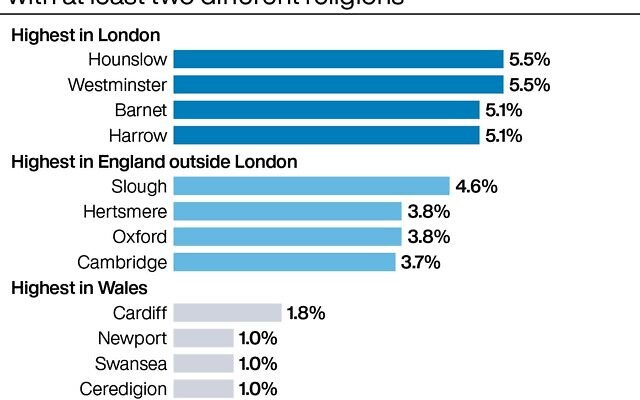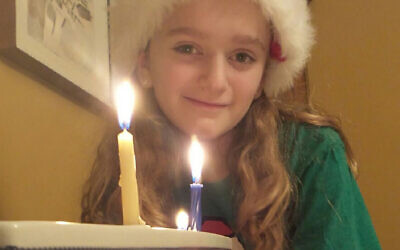Thousands living in multi-faith households, first figures of their kind show
The figures have been hailed as reflecting the “rich complexity of religious life” in the two nations.

Almost 300,000 households across England and Wales have people of different religions living alongside each other, according to analysis of census data collected and published for the first time.
The figures have been hailed as reflecting the “rich complexity of religious life” in the two nations and demonstrating that “increasingly, households and families are also arenas for religious diversity”.
The latest census, which took place on March 21 2021, showed the religious make-up of the population to be more diverse than ever, with fewer than half of people describing themselves as Christian.
It was also the first survey of its kind to report the religious affiliation within the 17.3 million multi-person households in England and Wales – of which 285,000 (1.6%) were recorded as having at least two different faiths.
The proportion is as high as one in 20 in some areas of London, including Hounslow and Westminster (both 5.5%) and Barnet and Harrow (5.1%), according to analysis by the PA news agency.

The highest figures in England outside London are Slough in Berkshire, where 4.6% of multi-person households had at least two religions stated on the census, and Hertsmere and Oxford (both 3.8%), while the highest in Wales is Cardiff (1.8%) and Newport (1.0%).
By contrast, Blaenau Gwent had the lowest proportion across England and Wales (0.4% of multi-person households), followed by Merthyr Tydfil, Hartlepool and Caerphilly (all 0.5%).
The PA analysis is based on the latest release of census data by the Office for National Statistics (ONS).
Reverend Richard Sudworth, the Church of England’s national inter-religious affairs adviser, said there will be “many stories of love, loyalty and mutual care across religious difference” behind the numbers.
He said: “The survey adds further to the picture of the rich complexity of religious life in our nations today.
“We are beginning to understand that many of our neighbourhoods are routinely places of religious diversity.
“What this survey shows is that, increasingly, households and families are also arenas for religious diversity. Underneath these numbers will be many stories of love, loyalty and mutual care across religious difference from which we can all draw lessons and indeed celebrate.”
The Muslim Council of Britain said the figures show that society is capable of “togetherness, mutual care and understanding”.
A spokesperson for the organisation said they have “always striven to bring diverse communities together in pursuit of the common good”, adding that their efforts show “Britain is a multi-cultural and religiously diverse one, a Britain in which people of all faiths and none demonstrate the capacity to come together in support of one another routinely”.
They added: “The existence of multi-religious households further reinforces our firm belief that we as a society hold an admirable capacity for togetherness, mutual care and understanding across our diverse communities, given the opportunity. The stories these figures represent are worth telling, and learning from.”
A more detailed breakdown of the types of religion practised at the time of the census shows that of the total 24.8 million households in England and Wales – including single-person homes – 11.0 million (44.3%) were recorded as Christian-only, while 3.1 million (12.6%) contained someone who was Christian and someone who had no religion.
A further 176,800 households (0.7%) had someone who was Christian and somebody of any other religion, though the data does not indicate the faith.
Some 2.4% of all households in the London borough of Barnet fell into this category – the highest for any local authority area.
For other single-faith households, the census recorded almost one million that were Muslim-only (988,900, or 4.0% of total households), along with 301,600 Hindu (1.2%), 143,000 Sikh (0.6%), 88,600 Jewish (0.4%), and 74,700 Buddhist (0.3%).
Hertsmere in Hertfordshire was the local authority area with the highest proportion of households that were Jewish-only (15.7%), while Tower Hamlets in London was highest for Muslim-only households (25.9%) and Harrow in London was highest for Hindu-only (22.7%).
Harrow and Slough both topped the list for households where the census recorded any combination of two religions that did not include Christianity, at 1.1%, compared with 0.1% (or 30,200) of all households in England and Wales.
Meanwhile there were 81,800 households (0.3% of the total) with any combination of three or more of the religion categories on the census – for example, three different faiths, or two faiths plus the “no religion” category.
The local area with the highest proportion for this criteria was Cambridge, at 1.3%.
However, in a sign of an increasingly secular society, the census suggested nearly a third of all households in England and Wales (30.3%, or 7.5 million) followed no religion at all.
Daniella Myers, director of the Hertfordshire Jewish Forum, said: “The Jewish population has consistently and steadily increased in Hertsmere over the last 20/ 30 years. Hertsmere now has the highest proportion of households that were Jewish-only (15.7%).
“According to the last census there are 18,346 Jewish people living in Hertsmere alone. While, that might not seem like a lot, but where there are only 292,000 Jewish people in the UK, this means that Hertsmere is a very significant Jewish area. Unlike the Jewish communities in London, Essex and Manchester, this is relatively young community.”

Thank you for helping to make Jewish News the leading source of news and opinion for the UK Jewish community. Today we're asking for your invaluable help to continue putting our community first in everything we do.
For as little as £5 a month you can help sustain the vital work we do in celebrating and standing up for Jewish life in Britain.
Jewish News holds our community together and keeps us connected. Like a synagogue, it’s where people turn to feel part of something bigger. It also proudly shows the rest of Britain the vibrancy and rich culture of modern Jewish life.
You can make a quick and easy one-off or monthly contribution of £5, £10, £20 or any other sum you’re comfortable with.
100% of your donation will help us continue celebrating our community, in all its dynamic diversity...
Engaging
Being a community platform means so much more than producing a newspaper and website. One of our proudest roles is media partnering with our invaluable charities to amplify the outstanding work they do to help us all.
Celebrating
There’s no shortage of oys in the world but Jewish News takes every opportunity to celebrate the joys too, through projects like Night of Heroes, 40 Under 40 and other compelling countdowns that make the community kvell with pride.
Pioneering
In the first collaboration between media outlets from different faiths, Jewish News worked with British Muslim TV and Church Times to produce a list of young activists leading the way on interfaith understanding.
Campaigning
Royal Mail issued a stamp honouring Holocaust hero Sir Nicholas Winton after a Jewish News campaign attracted more than 100,000 backers. Jewish Newsalso produces special editions of the paper highlighting pressing issues including mental health and Holocaust remembrance.
Easy access
In an age when news is readily accessible, Jewish News provides high-quality content free online and offline, removing any financial barriers to connecting people.
Voice of our community to wider society
The Jewish News team regularly appears on TV, radio and on the pages of the national press to comment on stories about the Jewish community. Easy access to the paper on the streets of London also means Jewish News provides an invaluable window into the community for the country at large.
We hope you agree all this is worth preserving.





















